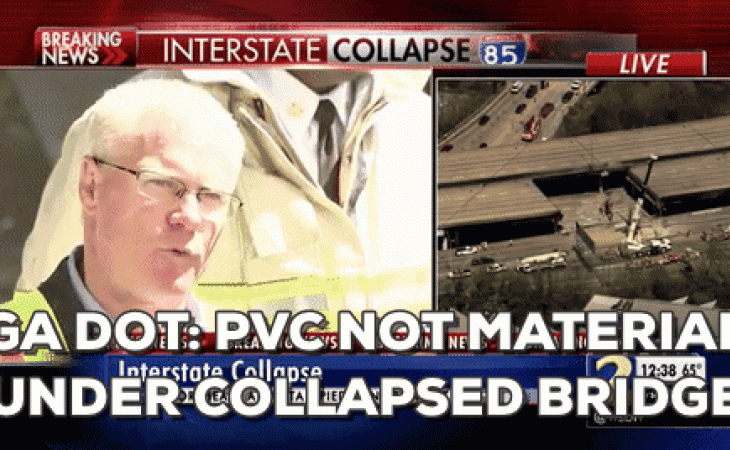This website uses cookies so that we can provide you with the best user experience possible. Cookie information is stored in your browser and performs functions such as recognising you when you return to our website and helping our team to understand which sections of the website you find most interesting and useful.
News
PVCPA and VI Statement Regarding the I-85 Bridge Collapse in Atlanta
WASHINGTON, DC – March 31, 2017 — The PVC Pipe Association (PVCPA) and Vinyl Institute (VI) are committed to making sure the facts surrounding the cause of the I-85 bridge collapse in Atlanta, GA prevail. Fortunately, there were no injuries and we are thankful that the responders to the scene kept themselves and the citizens of Atlanta safe.
There are many questions that have yet to be answered. But here is what we do know:
In a press conference, Russell McMurray, the Georgia Department of Transportation Commissioner, said the cause of the fire at this time is not known, but coils of high-density plastic telecommunications conduit were stored beneath the bridge. This is a different material than PVC piping. PVC is very rigid and is not used in coils of high-density telecommunications conduit.
PVC pipe is a stable material with low combustibility. It is difficult to ignite. And the type of thick smoke seen emanating from the I-85 bridge indicates a combination of combustible materials.
Commissioner McMurray also noted PVC pipe’s low combustibility in a statement issued earlier this morning. And the science confirms it.
Numerous studies over the years have affirmed this fact. For example, an upcoming paper in Fire and Materials Magazine by Dr. Marcelo Hirschler, a fire safety expert with GBH International, examines the fire safety of PVC and states that “PVC materials are among the least easily ignitable polymers.”
It’s important the investigation be allowed to run its course, where all of the facts are thoroughly examined before any rush to judgment is made as to the potential source of this event.
And PVC Pipe Association and the Vinyl Institute will continue to do their parts to ensure accurate information about PVC material exists in the public discourse moving forward.
About the PVC Pipe Association
Founded in 1971 as a non-profit organization, the PVC Pipe Association is the authoritative source of information on PVC pipe. It serves the engineering, regulatory, public health and standardization communities. Introduced in North America in 1951, corrosion-proof PVC piping offers a superior, proven and truly sustainable solution for underground infrastructure, helping municipalities spend smarter and giving taxpayers the best return on their dollar. For more information, visit: http://www.uni-bell.org
About the Vinyl Institute
The Vinyl Institute is a US trade association representing the leading manufacturers of vinyl, vinyl chloride monomer, and vinyl additives and modifiers. The VI works on behalf of its members to promote the benefits of the world’s most versatile plastic, used to make everything from household appliances to flooring, piping, roofing and wallcovering. For more information, visit https://www.vinylinfo.org.


